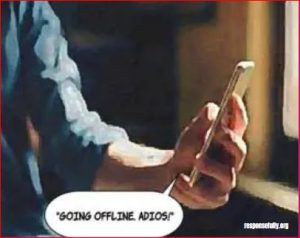Table of Contents
This article presents 20 excellent parting messages for when you’re leaving a group chat. Each message is carefully crafted to suit different social situations, with the goal of maintaining a positive and friendly atmosphere.
Whether you’re aiming for formality, expressing gratitude, or adding a touch of humor, these farewells are designed to end the digital interaction on a high note, while also leaving the door open for future engagements and maintaining a sense of connection.
There may come a time when you need to exit a group chat, whether it’s professional or casual. In such moments, it’s important to adjust your farewell message based on the tone of the conversation, ensuring it’s appropriate and considerate. Let’s work together to make those farewells memorable!
Great Last Words to Say When Leaving a Group Chat
- ‘Goodbye, everyone!’
- ‘See you later!’
- ‘I’m leaving now. Take care!’
- ‘Farewell, folks!’
- ‘Signing off. Catch you later!’
- ‘It’s time for me to go. Farewell!’
- ‘I’m leaving. Thanks for the chat!’
- ‘I’m logging off. Stay cool!’
- ‘Goodbye, friends!’
- ‘I have to run. See you around!’
- ‘I’m closing the chat. Later!’
- ‘I’m taking off. Be well!’
- ‘I’m exiting the chat. Goodbye!’
- ‘I’m leaving now. Keep chatting!’
- ‘It’s been enjoyable. Goodbye!’
- ‘I’m logging out. Until next time!’
- ‘I’m saying goodbye. Take care!’
- ‘It’s time for me to leave. See you!’
- ‘Goodbye for now, everyone!’
- ‘I’m going offline. Adios!’
‘Goodbye, everyone!’
“Saying ‘Bye, everyone!’ is a simple and friendly way to bid farewell to all members of a group chat. This departure offers a warm goodbye to everyone involved.
Its straightforwardness reflects a commonly used and direct method to end one’s involvement, fostering a relaxed atmosphere. The briefness of ‘Bye’ suggests a quick departure, maintaining a light tone suitable for various group dynamics.
Examples in Sentences:
‘Wrapping things up for now. Bye, everyone! Take care and catch you later!’
‘Exiting the family chat. Bye, everyone! Send my love to all. Talk to you soon!’

‘See you later!’
This informal and relaxed goodbye expresses optimism, looking forward to future interactions in the digital realm.
“See ya later” is a casual phrase often exchanged among friends, suggesting a temporary departure with the anticipation of reconnecting.
The expression conveys a friendly and easygoing atmosphere, making it appropriate for different social contexts.
Examples in Sentences:
“Gotta dash, pals! See ya later! Let’s organize something fun next time.”
“Wrapping up for now. See ya later, teammates! Ready for the next game!”
‘I’m leaving now. Take care!’
This leaving message merges a clear announcement of departure with a thoughtful wish for the welfare of the chat participants.
By directly stating your exit plan and including the empathetic “Take care,” it infuses a personal touch into your farewell, leaving a positive impact on those staying in the chat.
The blend of clarity and compassion renders this a succinct yet significant way to convey your departure.
Examples in Sentences:
“Ending the conversation. Departing now. Take care, colleagues! Feel free to reach out if you need anything.”
“Leaving the chat. Take care, everyone! Sending family love to all. Until our next chat!”
‘Farewell, folks!’
Using “folks” in this goodbye adds a friendly and familiar tone. This straightforward phrase bids farewell to the entire group in an informal manner.
“Folks” is commonly used in a friendly context, fostering a feeling of shared connection. It’s a timeless and widely recognized term that suits different social environments well.
Examples in Sentences:
“Take care, folks! Keep up the excellent work, classmates.”
“Fantastic book discussion, everyone! Farewell, folks! Excited for our next read.”
‘Signing off. Catch you later!’
This farewell combines a touch of formality with “Signing off” while balancing it with the casual and upbeat “Catch you later!” The phrase “Signing off” implies a deliberate disconnection from the chat, adding a hint of formality to the departure.
On the other hand, “Catch you later” injects informality, suggesting an anticipation of future encounters and maintaining a positive vibe.
This mix of formality and friendliness suits various social contexts, offering a clear indication of departure while leaving room for a cheerful reunion.
Examples in Sentences:
“It’s time to sign off. Catch you later, buddies! Keep the group alive until I’m back.”
“We’re wrapping up the gaming session. Signing off now. Catch you later, squad!”
‘It’s time for me to go. Farewell!’
The simplicity of “Time to go” communicates a direct and unequivocal departure from the ongoing conversation. This succinct phrase indicates a quick exit, making it fitting for situations where a straightforward farewell is warranted.
It also adds a touch of formality and traditional farewell sentiment to the message, creating a well-rounded tone.
By providing a clear indication that the individual is leaving the chat, it ensures a courteous and definitive end to their participation.
Examples in Sentences:
“It’s time to go. Farewell, family! I’ll see you all soon.”
“The meeting has concluded. Time to go. Farewell, team! Feel free to reach out for any follow-up.”
‘I’m leaving. Thanks for the chat!’
“Leaving. Thanks for chatting!” expresses appreciation for the conversation before departing. This message not only announces the departure but also conveys gratitude for the shared exchange.
You can also include a positive and thankful remark in the farewell to emphasize the significance of the interaction. This phrase fosters a friendly and inviting atmosphere.
It serves as a means to show gratitude for the engagement while bidding farewell in a thoughtful and uplifting manner.
Examples in Sentences:
“Wrapping up in the chat. Thanks for the memes and updates! Catch you all later!”
“Closing the project chat. Appreciate the collaboration! Until our next update, team!”
‘I’m logging off. Stay cool!’
This reply blends a relaxed departure with a warm wish to “stay cool,” indicating a deliberate disconnect from the chat with a hint of formality.
Simultaneously, it introduces a playful and friendly touch, infusing the departure message with personality.
This approach is apt for chats that embrace a casual and informal tone, offering a cheerful end to the interaction.
Examples:
“Signing off. Stay cool, everyone! Let’s brainstorm something awesome for next time.”
“Game over for now. Logging off. Stay cool, gamers! Looking forward to the next session!
‘Goodbye, friends!’
“Farewell, friends!” is a heartfelt goodbye that acknowledges the camaraderie within a chat. Addressing the group as ‘friends’ imbues the message with warmth.
By employing this term, it cultivates a feeling of friendship within the chat. ‘Farewell’ adds a hint of formality, making it suitable for instances where a slightly more formal farewell is appropriate.
The blend of warmth and formality leaves a positive impact on the remaining participants, nurturing a sense of connection even as you depart from the chat.
Examples:
“Farewell, friends! I’m leaving the chat but eagerly anticipate staying connected.”
“Concluding our project discussion. Farewell, friends! Let’s maintain the momentum.”
‘I have to run. See you around!’
The informal and brisk “Gotta run” injects a sense of urgency into the departure message, signaling a prompt exit. Additionally, it implies an anticipation of future encounters, maintaining an optimistic tone.
This departure style is fitting for situations requiring a swift exit, while expressing a desire for future interactions in a friendly and casual manner.
Examples:
“Gotta run for a meeting. See you around, colleagues! Feel free to reach out if you need anything.”
“Heading out now. Gotta run. See you around, amigos! Looking forward to the weekend plans!”

‘I have to run. See you around!’
In this response, “Closing the chat” adds a touch of formality to the departure message, signaling a deliberate end to the ongoing conversation.
The informal “Later!” maintains a casual and friendly tone, implying the possibility of reconnecting later. This blend strikes a balance between formality and informality, making it suitable for various group dynamics.
It offers a clear indication that the chat is concluding while leaving room for future engagements.
Examples:
“Closing the family chat. Later, everyone! Let’s stay in touch. Love you all.”
“Wrapping up reunion plans. Closing the chat now. Later, friends! Can’t wait to see you!”
‘I’m closing the chat. Later!’
The informal “Later!” maintains a casual and friendly tone, implying the possibility of reconnecting later. This blend strikes a balance between formality and informality, making it suitable for various group dynamics.
It offers a clear indication that the chat is concluding while leaving room for future engagements.
Examples:
“Closing the family chat. Later, everyone! Let’s stay in touch. Love you all.”
‘I’m exiting the chat. Goodbye!’
Utilizing “Exiting the chat” adds a formal tone to this farewell, signaling a deliberate and decisive departure.
“Goodbye” serves as a timeless and universally recognized farewell, bringing a conclusive end to the ongoing conversation.
This approach is suitable for scenarios necessitating a formal departure, with an emphasis on clarity and closure.
Sentence examples:
“After our meeting, I’m exiting the chat. Goodbye, team! Don’t hesitate to reach out for any updates.”
“As we conclude our chat, I’m exiting for now. Goodbye, everyone! Until we meet again.
‘I’m leaving now. Keep chatting!’
This departure message not only declares the departure but also urges the remaining participants to keep the conversation going.
Furthermore, the response conveyed a supportive and friendly tone to the farewell, encouraging the continuation of the dialogue.
It leaves room for ongoing interaction among the remaining participants, fostering a positive and inclusive environment.
This approach is fitting for situations where the departing individual wishes to express support for the ongoing chat.
Sentence examples:
“Leaving the chat. Keep the conversation flowing, everyone! I’m eager to catch up later.”
“Signing off. Keep the gaming spirit alive, team! Keep me posted on how the next match unfolds.”
‘It’s been enjoyable. Goodbye!’
This departure message reminisces about the enjoyable moments in the chat with the phrase “It’s been fun,” adding a positive and appreciative touch to the farewell, expressing gratitude for the shared interaction.
This style of departure is fitting for situations where you wish to acknowledge the pleasant moments in the chat and convey appreciation for the overall experience.
This expression not only serves as a farewell but also leaves behind a positive memory, making it suitable for situations where you aim to depart on a high note and convey gratitude for the shared camaraderie.
Sentence examples:
“I’ve had a wonderful time chatting. It’s been fun. Goodbye, pals! Looking forward to our next virtual hangout!”
“Finalizing plans was a delight. It’s been fun. Farewell, friends! Excited for the weekend ahead!”
‘I’m logging out. Until next time!’
The technical term “Logging out” signifies a deliberate disconnection from the chat, adding a formal touch to this departure message.
The inclusion of “Until next time!” maintains an optimistic and forward-looking tone, implying an expectation of reconnecting in the future.
This blend of formality and friendliness creates a well-rounded departure message suitable for various social settings. It communicates a definite exit while leaving space for the possibility of future interactions, enhancing the overall positive tone of the farewell.
Sentence examples:
“Logging out after our discussion. Until next time, classmates! Let’s stay engaged in our topics.”
“Signing off from the book club. Until next time, readers! Happy reading until our next meeting.”
‘I’m saying goodbye. Take care!’
This departure message merges the directness of “Saying goodbye” with the heartfelt wish “Take care,” effectively communicating a clear exit while expressing genuine concern for the well-being of the remaining participants.
The inclusion of “Take care” infuses a personal touch into the farewell, fostering a positive and caring atmosphere.
This approach is fitting for situations where a departure is accompanied by a warm wish for the continued well-being of those in the chat, highlighting the importance of maintaining a connection beyond the digital realm.
Sentence examples:
“Concluding our work chat. Saying goodbye, colleagues! Take care and tackle those projects.”
“It’s time for me to go. Saying goodbye, friends! Take care and catch up with you all soon.”
‘It’s time for me to leave. See you!’
This succinct departure message employs the straightforward phrase “Time to leave” to express a clear exit from the ongoing conversation.
The addition of “See you!” injects a friendly and optimistic tone, suggesting an anticipation of future encounters. This combination maintains a positive and informal atmosphere, suitable for various group dynamics.
It marks a definite departure while leaving room for friendly reunions, fostering an overall positive and anticipatory mood.
Sentence examples:
“Wrapping up the game session. Time to leave. See you, gamers! Excited for the next round.”
“Leaving the chat now. Time to leave. See you, everyone! Keep the updates coming.”
‘Goodbye for now, everyone!’
This departure message merges the casual and friendly “Bye for now” with the inclusive address of “everyone,” fostering a sense of camaraderie within the group.
The phrase “Bye for now” suggests a temporary farewell, leaving space for the potential of future interactions. This style of departure is appropriate for situations where you aim to convey a lighthearted and temporary goodbye while still maintaining a positive connection with the group.
Examples:
“Wrapping up our family chat. Bye for now, everyone! Please send my love. Looking forward to our next call.”
“Concluding our reunion plans. Bye for now, everyone! Can’t wait to see you all!”
‘I’m going offline. Adios!’
Utilizing the technical term “Going offline” conveys a deliberate disconnection from the chat.
Adding the playful term “Adios” injects a sense of lightheartedness and friendliness to the farewell. This departure style is fitting for situations where a playful and informal tone is embraced.
It ensures a memorable and positive conclusion to the interaction, leaving a lasting impression and conveying a sense of departure with a hint of humor.
Examples:
“Signing off from the group. Going offline now. Adios, amigos! Keep connected online.”
“Logging off now. Going offline. Adios, friends! Let’s make this weekend epic!”

Frequently Asked Questions
Certainly! Here are some frequently asked questions along with their answers:
What is the capital of France?
The capital of France is Paris.
How many continents are there in the world?
There are seven continents in the world: Africa, Antarctica, Asia, Europe, North America, Australia (Oceania), and South America.
Who wrote the play “Romeo and Juliet”?
“Romeo and Juliet” was written by William Shakespeare.
What is the boiling point of water?
The boiling point of water is 100 degrees Celsius or 212 degrees Fahrenheit at sea level.
How do I convert Celsius to Fahrenheit?
To convert Celsius to Fahrenheit, you can use the formula: Fahrenheit = (Celsius × 9/5) + 32.
What is the tallest mountain in the world?
Mount Everest, located in the Himalayas, is the tallest mountain in the world.
Who was the first person to step on the moon?
Neil Armstrong was the first person to step on the moon during the Apollo 11 mission in 1969.
How many planets are there in our solar system?
There are eight planets in our solar system: Mercury, Venus, Earth, Mars, Jupiter, Saturn, Uranus, and Neptune.
Conclusion
these frequently asked questions cover a range of topics from geography and science to literature and history. By providing accurate and concise answers, they aim to enhance understanding and knowledge on various subjects.
Whether it’s about capitals, famous works of art, or scientific concepts, having access to this information can be both informative and enlightening. If you have any further questions or need more information, feel free to ask!The phrase “Bye for now” suggests a temporary farewell, leaving space for the potential of future interactions. This style of departure is appropriate for situations where you aim to convey a lighthearted and temporary goodbye while still maintaining a positive connection with the group.
